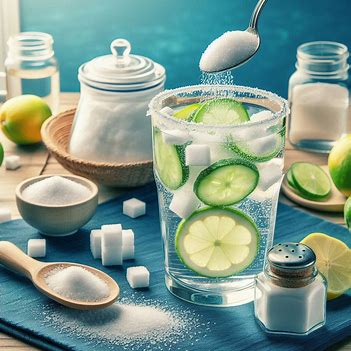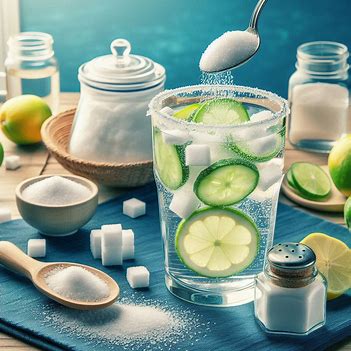Healthy Eating
Adding salt to drinking water for hydration

Adding salt to drinking water for hydration can be helpful under specific circumstances, but it is not generally necessary for most people. Here’s an overview of the concept and its potential benefits and risks:
Why Salt Could Help:
- Electrolyte Balance: When you sweat (due to exercise or heat), you lose not just water but also electrolytes, particularly sodium. Electrolytes like sodium help maintain fluid balance in the body, support nerve function, and regulate muscle contractions. Adding a small amount of salt to water can help replenish lost sodium and improve hydration, especially after intense exercise or in hot conditions.
- Preventing Hyponatremia: Drinking too much plain water without replenishing sodium can dilute the concentration of sodium in the blood, leading to hyponatremia (low blood sodium). This condition can cause nausea, headache, confusion, and in severe cases, can be life-threatening. Adding salt to water in extreme hydration scenarios can help prevent this issue.
- Improved Fluid Retention: Salt can help the body retain water, which can be beneficial in certain situations where rapid dehydration might occur, such as during prolonged exercise or in extremely hot weather.
When Adding Salt May Not Be Necessary:
- Everyday Hydration: Most people get enough sodium from their regular diet, especially if they eat processed foods, which tend to be high in salt. In these cases, there’s no need to add salt to drinking water for hydration.
- Health Risks of Excess Salt: Too much salt in your diet can raise blood pressure, increasing the risk of heart disease, stroke, and kidney issues. For individuals who need to limit their sodium intake (e.g., those with high blood pressure), adding salt to water may be harmful and counterproductive.
- Balanced Electrolyte Solutions: Sports drinks and oral rehydration solutions (ORS) contain a balanced mix of electrolytes, including sodium, potassium, and other minerals. These are better alternatives than simply adding table salt to water, as they offer a scientifically balanced formula for rehydration.
How to Use Salt in Water Safely:
- If you are in a situation that requires electrolyte replenishment (e.g., endurance sports, hot climates), a pinch of salt can be added to water (along with some sugar or lemon juice for taste).
- Instead of regular salt, you might use electrolyte powders or tablets, which are specifically designed for hydration.
Conclusion:
For most people, drinking plain water is enough to stay hydrated, and there’s usually no need to add salt unless you’re engaging in intense physical activity or are in extreme heat. If you’re trying to manage blood pressure or other cardiovascular concerns, it’s best to avoid adding extra salt and instead opt for balanced electrolyte solutions when needed.
